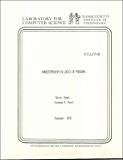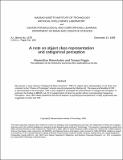Browsing Computer Science and Artificial Intelligence Lab (CSAIL) by Title
Now showing items 2206-2225 of 3804
-
Non-Essential Communication in Mobile Applications
(2015-05-04)This paper studies communication patterns in mobile applications. Our analysis shows that 65% of the HTTP, socket, and RPC communication in top-popular Android applications from Google Play have no effect on the user-observable ... -
Non-Metrical Navigation Through Visual Path Control
(2008-06-06)We describe a new method for wide-area, non-metrical robot navigationwhich enables useful, purposeful motion indoors. Our method has twophases: a training phase, in which a human user directs a wheeledrobot with an attached ... -
Non-Monotonic Logic I
(1979-01-01)"Non-monotonic" logical systems are logics in which the introduction of new axioms can invalidate old theorems. Such logics are very important in modeling the beliefs of active processes which, acting in the presence ... -
Non-Monotonic Logic I
(1978-08-01)"Non-monotonic" logical systems are logics in which the introduction of new axioms can invalidate old theorems. Such logics are very important in modeling the beliefs of active processes which, acting in the presence ... -
Non-ontrusive Synchonizers
(1990-04) -
Non-Rigid Motion and Regge Calculus
(1987-11-01)We study the problem of recovering the structure from motion of figures which are allowed to perform a controlled non-rigid motion. We use Regge Calculus to approximate a general surface by a net of triangles. The ... -
Nondeterminism in Logics of Programs
(1978-02)We investigate the principles underlying reasoning about nondeterministic programs, and present a logic to support this kind of reasoning. Our logic, an extension of dynamic logic ([22] and [12]), subsumes most existing ... -
A Nondeterministic Minimization Algorithm
(1990-09-01)The problem of minimizing a multivariate function is recurrent in many disciplines as Physics, Mathematics, Engeneering and, of course, Computer Science. In this paper we describe a simple nondeterministic algorithm ... -
Nondeterministic Time and Space Complexity Classes
(1974-09)The marginal utility of the Turing machine computational resources running time and storage space are studied. A technique is developed which, unlike diagonalization, applies equally well to nondeterministic and deterministic ... -
Nonlinear Analog Networks for Image Smoothing and Segmentation
(1991-01-01)Image smoothing and segmentation algorithms are frequently formulatedsas optimization problems. Linear and nonlinear (reciprocal) resistivesnetworks have solutions characterized by an extremum principle. Thus,sappropriately ... -
Nonlinear Interactions in a Dendritic Tree: Localization, Timing and Role in Information Processing
(1981-09-01)In a dendritic tree transient synaptic inputs activating ionic conductances with an equilibrium potential near the resting potential can veto very effectively other excitatory inputs. Analog operations of this type can ... -
Nonlinear Latent Variable Models for Video Sequences
(2005-06-06)Many high-dimensional time-varying signals can be modeled as a sequence of noisy nonlinear observations of a low-dimensional dynamical process. Given high-dimensional observations and a distribution describing the ... -
A Nonparametric Approach to Pricing and Hedging Derivative Securities via Learning Networks
(1994-04-01)We propose a nonparametric method for estimating derivative financial asset pricing formulae using learning networks. To demonstrate feasibility, we first simulate Black-Scholes option prices and show that learning ... -
Nonparametric Belief Propagation and Facial Appearance Estimation
(2002-12-01)In many applications of graphical models arising in computer vision, the hidden variables of interest are most naturally specified by continuous, non-Gaussian distributions. There exist inference algorithms for discrete ... -
Nonparametric Sparsity and Regularization
(2011-09-26)In this work we are interested in the problems of supervised learning and variable selection when the input-output dependence is described by a nonlinear function depending on a few variables. Our goal is to consider a ... -
Nonsequential Computation and Laws of Nature
(1986-05)Traditionally, computational complexity theory deals with sequential computations. In the computational models the underlying physics is hardly accounted for. This attitude has persisted in common models for parallel ... -
A Note of Zipf's Law, Natural Languages, and Noncoding DNA Regions
(1995-03-01)In Phys. Rev. Letters (73:2), Mantegna et al. conclude on the basis of Zipf rank frequency data that noncoding DNA sequence regions are more like natural languages than coding regions. We argue on the contrary that an ... -
A Note on Equivalences Among Logics of Programs
(1981-12)Several different first order formal logics of programs -- Algoritmic Logic, Dynamic Logic, and Logic of Effective Definitions -- are compared and shown to be equivalent to a fragment of constructive L ω1ω. When programs ... -
A Note on Object Class Representation and Categorical Perception
(1999-12-17)We present a novel scheme ("Categorical Basis Functions", CBF) for object class representation in the brain and contrast it to the "Chorus of Prototypes" scheme recently proposed by Edelman. The power and flexibility ... -
A Note on Perturbation Results for Learning Empirical Operators
(2008-08-19)A large number of learning algorithms, for example, spectral clustering, kernel Principal Components Analysis and many manifold methods are based on estimating eigenvalues and eigenfunctions of operators defined by a ...



















